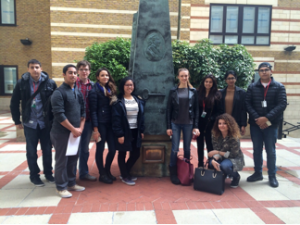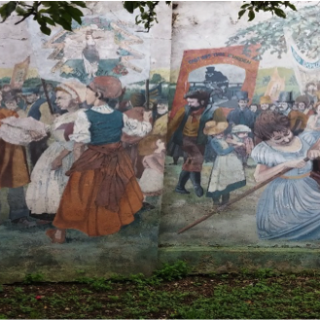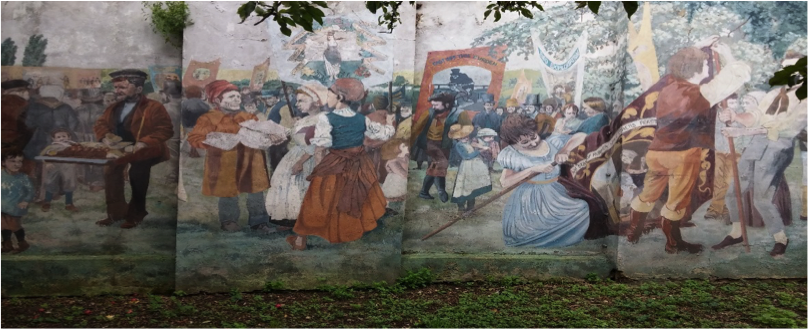All of our first year law undergrads took part in an exercise in week one of their LLB where they escaped City and went to visit a number of buildings of significance in the local area, before tackling some research questions.
They were then asked to write a blog post inspired by their travels. 21 winners were selected from all those posts submitted – this is one of those – thanks to Jack Ford.
Recently I visited the wonders of Islington such as the home of George Orwell before he passed away, the statue of Thomas Paine who wrote ‘Common Sense’ which advocated for less governmental control, the mural in memory of the Tolpuddle Martyrs who were imprisoned for swearing an oath of secrecy and the home of playwright Joe Orton who claimed his sentence for defacing public books was harsh because he was homosexual. With intrusions into our lives today which are comparable to those of the past and even sometimes surpass them in terms of their seriousness we must be concerned about how close we are to Orwell’s novel ‘1984’ and if there is anything that we can do to protect our right to a private and family life which although may be contained within article 8 of the European Convention of Human Rights, is still under threat in the U.K.
The revelations in 2013 that the GCHQ had been collecting mass amounts of user data and intercepting telephone communications led many to realise that we are in a society similar to the one in “1984” where we had no privacy. This is coupled with the frequency of CCTV cameras on city streets which the general public seem to be unable to access, as illustrated by Keith Spiller who tried to obtain footage and “In total, Spiller wrote 37 letters, made 31 phone calls, and spent £60 making requests. Of the 17 CCTV operators he contacted, only six provided him with his footage”[1]. Strict governmental control over our lives has led to mass unrest and riots throughout history such as the American Revolution, where the Intolerable Acts of King George III led to the decision of America to fight for their freedom. Although our government has evolved since the 1700’s, it would be impossible to imagine a year passing without any protests against strict governmental control.
However, what placates most of society into believing that these intrusions are necessary is the fear of terror. The 9/11 bombings shook the country to its core, and events such as these have allowed the government to pass legislation greatly infringing upon our rights without any challenge from the public such as the Anti-Terrorism Crime and Security Act 2001 which allowed for the detention of suspected terrorists without charge indefinitely. Although the right to liberty is seen by the government as dispensable at the first sight of danger, the right to a private and family life is just as dispensable such as with the Regulation and Investigatory Powers Act 2000 which gives a great amount of freedom for public bodies to engage in mass surveillance. Even in the face of apparent evil we must ask ourselves, is this enough for us to be deprived of our most fundamental human rights?

Although the government seems to have free reign in passing legislation which intrudes into our fundamental human rights, they can be challenged through the Human Rights Act 1998 which allows for the courts to make a statement saying that legislation is incompatible with human rights, called a declaration of incompatibility. Parliament does not need to amend legislation following a decision but it almost always does such as following the Belmarsh case[2] where the Anti-Terrorism Crime and Security Act 2001 was amended to be compatible with the right to liberty. Furthermore, if domestic courts reject an argument on the basis it is compatible with human rights, an appeal can be made to the European Court on Human Rights. This is commonly used by ‘Liberty’ which has successfully launched challenges against data laws such as in 2009 where it was successfully claimed that the interception of communications by an electronic test facility in the 1990’s was a breach of article 8[3]. However, parliamentary sovereignty still reigns supreme and so can still keep legislation which infringes upon our rights.
The fight for the right to privacy between the government and the people has lasted and will continue to last for generations. While the power of the courts to curb the tide of this legislation is effective, the greatest tool to ensure human rights are protected is the public. With over 64 million in the U.K, we may seem insignificant but everyone can help. Not only can we join groups such as ‘Liberty’ and ‘No-CCTV’ which fight for the right to privacy with organised protests and challenges in the courts but the electoral system in the U.K allows us to and elect those who will fight for our fundamental rights. We are closer to ‘1984’ than we would like to believe, and without drastic action Orwell’s novel will become a reality.
[1] Berg, Nate. ‘What Happens When You Ask To See CCTV Footage?‘ The Guardian. Accessed 1 Oct. 2015.
[2] A and others v Secretary of State for the Home Department [2004] UKHL 56
[3] Liberty v UK (2009) 48 EHRR 1


